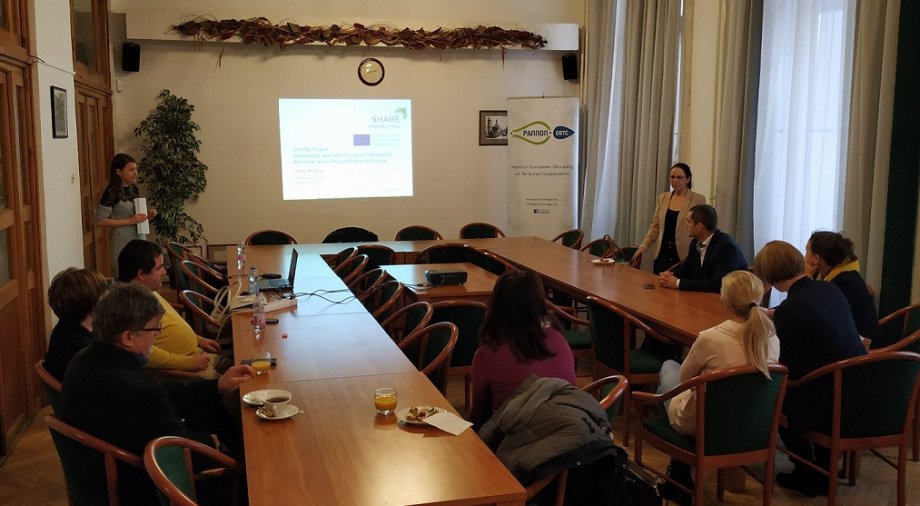Workshop with SHARE project experts on the action plan

The abbreviation refers to the topic at the same time, as the acronym translates to Hungarian as “Sustainability of the Cultural Heritage of Cities in Europe” and to the method, as the English word Share means “to share something, such as experience. The aim was to examine how public policy documents governing cultural heritage work at the local level and to make recommendations on how to make them sustainable in the light of local experience. The stakes are high, as culture is an important part of our national and European identity, and it is no coincidence that its sustainable operation is one of the key objectives of the Europe 2020 strategy!
The PANNON EGTC has thus entered the European area of development, successfully joining the European cultural heritage community, as it has created opportunities for decision-makers and leading experts from 7 SHARE countries to think together and learn from each other. The lead partner is the Umbira region in Italy, the cradle of the “Slow city” movement, and the lead expert is the tourism research team at the University of Greenwich in London, but also cities in Spain, Sweden, Romania and Croatia, as well as the Pannon EGTC. Seven countries, seven different locations, seven different cases, yet a lot of common topics to think about together:
What is the role of cultural heritage in the period of the knowledge industry revolution?
Can cultural heritage be a driver of a city’s economic renewal?
What is the role of smart technologies in the sustainability of cultural heritage?
How should our city centers be transformed so that they can serve the everyday needs of city dwellers at the same time, but also make the cultural goods of the city center accessible and consumable to visitors?
How can the aspects of cultural heritage protection and consumability be reconciled so that our cultural heritage does not become an open-air museum?
What marketing tools can be used to succeed in the European cultural heritage market?
How can our existing cultural heritage be developed into a competitive package?
Such and similar issues have been explored and discussed by decision makers and researchers.
During the program launched in early 2017, 7 case studies were completed in the first round, which revealed the challenges of the local operation of cultural heritage, which was discussed for the first time by an international team of experts in Pécs this summer. Based on these, the cities carried out detailed research and a so-called “benchmarking” task to examine the background of the case studies in more detail. Finally, local action plans have been drawn up to increase the competitiveness and social and economic sustainability of the local cultural heritage. However, we do not only want to use this experience locally, as Interreg Europe seeks to incorporate these recommendations into public policy documents on cultural heritage management.
Following the press conference, Pannon EGTC and experts will discuss with the local “stake holders” the recommendations of the completed action plan, the finalized version of which will be made available on the Interreg Europe and Pannon EGTC websites. By drawing up the action plan, we are confident that we will be able to contribute to the sustainable development of Pécs and to the fact that the city's world-class cultural heritage can play a worthy role in this.
SHARE - A Sustainable Approach to Cultural Heritage for the Urban Areas Requalification in Europe website: http://www.interregeurope.eu/share/

